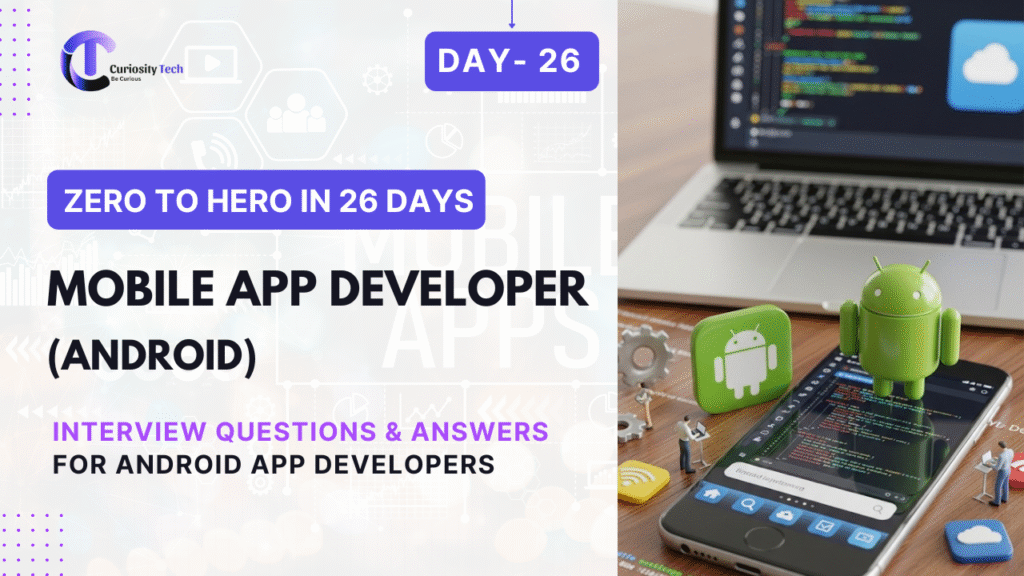Introduction
Interviews are not just about testing technical knowledge; they also measure your problem-solving mindset, coding clarity, and communication skills. Many beginners struggle because they either memorize answers or ignore real-world applications.
At CuriosityTech.in (Nagpur, Wardha Rd, Gajanan Nagar), interview prep is integrated into training—students not only learn Android but also practice mock interviews, code challenges, and debugging under pressure. This blog will serve as your interview playbook with top Android Q&As, preparation tips, and common mistakes to avoid.
Section 1 – Frequently Asked Android Interview Questions & Answers
1. What is the Android Activity Lifecycle? Why is it important?
Answer: The Activity Lifecycle defines how an app behaves as it transitions between states: Created → Started → Resumed → Paused → Stopped → Destroyed.
- It’s crucial because improper handling (e.g., not saving state in onPause) leads to crashes, data loss, or memory leaks.
- Example: If a user rotates the screen and state isn’t saved in onSaveInstanceState, the app may restart and lose user input.
2. Difference between Service, IntentService, and JobScheduler?
Answer:
- Service: Runs in the background indefinitely. Example: playing music.
- IntentService: Handles background tasks sequentially in a worker thread. Example: file download.
- JobScheduler / WorkManager: Used for deferred tasks that need system-optimized scheduling (like syncing data). In 2025, WorkManager is the preferred approach for most background tasks.
3. How do you optimize app performance in Android?
Answer:
- Use lazy loading for images.
- Apply ViewBinding/Compose to avoid heavy layouts.
- Optimize database queries with Room and indexing.
- Minimize battery drain with JobScheduler for background tasks.
- Tools: Android Profiler, LeakCanary.
At CuriosityTech, students build apps and then profile them for performance bottlenecks—a practice often ignored by self-learners.
4. Explain MVVM Architecture. Why is it used?
Answer: MVVM stands for Model-View-ViewModel.
Why used? → It separates concerns, improves testability, and makes apps scalable. Most modern Android projects use MVVM with Jetpack libraries.
5. What are Coroutines in Kotlin? How do they improve async tasks?
Answer:
Coroutines are lightweight threads managed by Kotlin. Unlike traditional threads, they:
- Consume less memory.
- Support structured concurrency.
- Make async tasks readable (like synchronous code).
Example: Fetching data from API with suspend functions and updating UI in MainScope.
6. What is the difference between implicit and explicit intents?
Answer:
- Explicit Intent: Directs to a specific Activity or Service. Example: Intent(this, SecondActivity::class.java).
- Implicit Intent: Asks the system to handle the action. Example: opening camera via Intent(MediaStore.ACTION_IMAGE_CAPTURE).
7. How do you secure an Android app?
Answer:
- Use EncryptedSharedPreferences / SQLCipher.
- Apply certificate pinning for network security.
- Store secrets in Keystore.
- Don’t request unnecessary permissions.
(CuriosityTech projects require every app to pass a security checklist before completion.)
8. What are Jetpack libraries? Name a few.
Answer: Jetpack libraries are Google-maintained components that accelerate app development.
Examples:
- Room (database)
- WorkManager (background tasks)
- Navigation (safe navigation between screens)
- Compose (UI toolkit)
9. What is the difference between RecyclerView and ListView?
Answer:
- RecyclerView: More flexible, supports animations, and reuses views efficiently.
- ListView: Older, less efficient. Today, RecyclerView (or LazyColumn in Compose) is the industry standard.
10. How do you publish an app on Google Play Store?
Answer: Steps:
- Create a Google Play Console account.
- Prepare signed .aab bundle.
- Add app details (name, description, screenshots).
- Set permissions, pricing, content rating.
- Upload and submit for review.
CuriosityTech runs Play Store workshops, where learners publish real apps before completing training.
Section 2 – Interview Preparation Tips
- Master the fundamentals: Activity lifecycle, intents, threading, storage.
- Build a portfolio: At least 3 polished apps (e.g., chat app, e-commerce app, fitness tracker).
- Mock interviews: Practice with peers or mentors.
- Explain clearly: Don’t just say “MVVM is good”—explain why.
- Stay updated: Read release notes of Android Studio & Jetpack libraries.
Section 3 – Common Mistakes Candidates Make
| Mistake | Impact in Interview | How to Fix |
| Memorizing answers | Fails in follow-up questions | Practice explaining concepts in own words |
| Weak on basics | Struggle with lifecycle questions | Revise fundamentals regularly |
| No real projects | Resume looks empty | Build & showcase apps |
| Ignoring performance/security | Seen as careless developer | Profile & secure apps |
| Poor communication | Misunderstood answers | Practice mock interviews |
Section 4 – Becoming Interview-Ready with CuriosityTech
At CuriosityTech:
- Mock technical interviews simulate real company panels.
- Debugging challenges prepare you for tricky coding rounds.
- Soft skill training ensures you can explain your ideas clearly.
- Alumni network connects learners with job opportunities in Nagpur, Pune, and beyond.
Conclusion
Becoming an Android professional isn’t just about writing code—it’s about understanding concepts, communicating confidently, and solving real-world problems.
If you’re preparing for Android interviews in 2025, the right roadmap combines technical mastery, project-based learning, and mentorship. At CuriosityTech.in, we walk with you from your first app to your first job offer. Address: 1st Floor, Plot No 81, Wardha Rd, Gajanan Nagar, Nagpur; Phone: +91-9860555369; Email: contact@curiositytech.in; Website:https://curiositytech.in ; LinkedIn: Curiosity Tech; Instagram: curiositytechpark; Facebook: Curiosity Tech



